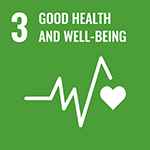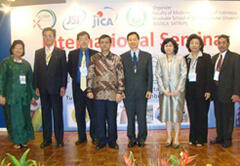Identification of Anti-Hepatitis C Virus (HCV) Substances and Development of HCV and Dengue Vaccines
Principal Investigator
-


Prof.
Graduate School of Medicine/School of Medicine, Kobe University
HOTTA Hak
ODA Recipient Country
Republic of Indonesia
Research Institutions in Japan
Kobe University / National Institute of Biomedical Innovation (NIBIO)
Research Institutions in Counterpart Country
University of Indonesia (UI) / Airlangga University (AU) / Indonesian Institute of Sciences (LIPI)
Adoption fiscal year
FY 2009
Research Period
4 Years
Overview of the Research Project
Technical cooperation to confront two rampant infectious diseases
Although an estimated 170 million people worldwide are chronically infected with hepatitis C virus (HCV), no HCV vaccine has yet been developed. Dengue fever too is feared to be spreading beyond tropical zones. New treatment and prevention measures for these two infectious diseases are urgently required. This project aims to develop antiviral drugs that are effective against HCV from endemic Indonesian and Japanese plants and microorganisms, and also aims to use genetic engineering to develop vaccines for HCV and dengue.
New plant- and microorganism-derived hepatitis C drugs and vaccines created using genetic engineering
We have discovered anti-HCV substances effective against HCV in plants and microorganisms from both countries, and are investigating in detail the mechanisms by which these substances inhibit HCV growth. We have also developed a HCV DNA vaccine and dengue vaccine that are safer and that provide strong immunity against HCV and dengue virus. We have also developed an HCV treatment vaccine that can be administered orally using Bifidobacterium longum.
Photo gallery
Research Project Web site
Press Release
Links
Projects
Contact Us
Japan Science and Technology Agency (JST)
Department of International Affairs
SATREPS Group
TEL : +81-3-5214-8085
Related articles by Category
- Infectious Diseases Control
Infectious Diseases Control

 Kingdom of Thailand
Kingdom of Thailand
Helping Tuberculosis Patients: Strengthening TB Control Strategies through Genomic Analysis!
Integrative Application of Human and Pathogen Genomic Information for Tuberculosis Control
- Indonesia
Environment / Energy
(Carbon Neutrality)
 Republic of Indonesia
Republic of Indonesia
Creating a new chemical industry linked to Indonesian agriculture!
Development of Integrated Bio-circular Economy from Food and Energy Estate Waste Fraction to Biofuel and Bio-chemicals
- Asia
Environment / Energy
(Carbon Neutrality)
 Socialist Republic of Vietnam
Socialist Republic of Vietnam
Regenerating cassava farm land by storing carbon in the soil!
Transforming the Cassava Production System in Vietnam by Establishing Regenerative Farming and Smart Starch Supply Chain Management
- SDGs : Goal.3
Environment / Energy
(Global-scale environmental issues)
 Kyrgyz Republic
Kyrgyz Republic
Assessing air pollution throughout the Kyrgyz Republic using satellites and regional chemical transport modeling
Development of a Satellite Data and a Regional Chemical Transport Modeling-based Air Pollution Assessment System and Formation of a Research Center for Air Pollution Studies



















